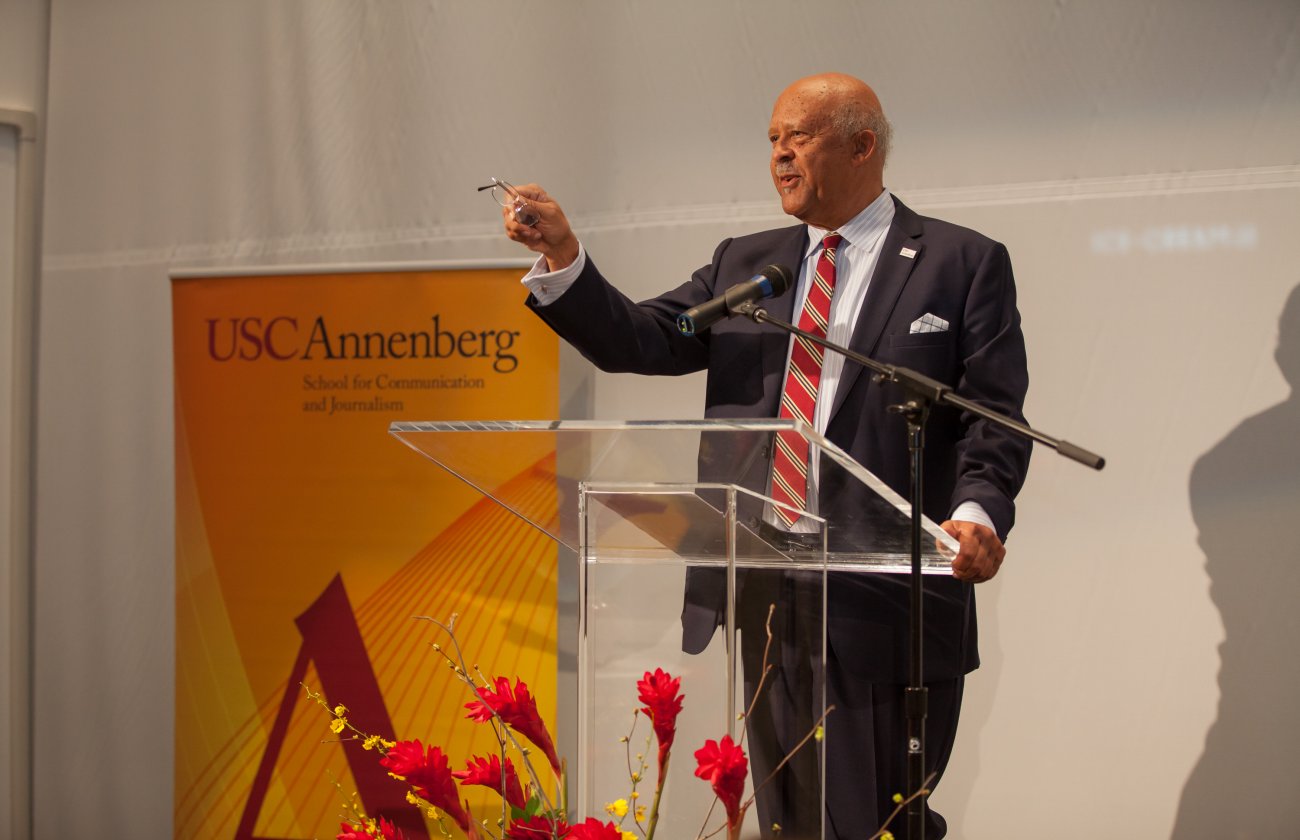USC Annenberg faculty and administration welcomed the class of 2017 by encouraging them to become leaders of revolution in the communication and media industries.
“The work that each and every one of you will be doing over the next four years is unique in the university. It’s unique in the United States, and it’s unique in the world,” Dean Ernest J. Wilson III told a packed auditorium of incoming USC Annenberg freshman, at Thursday’s assembly. “We expect you to invent the future – not be passive recipients of it – but to really help shape it so that it’s a better world, a more equitable world, a fairer world and a more open world.”
Dean Wilson implored students to utilize the “Annenberg Advantage,” the academic convergence of communication, public relations, journalism and public diplomacy as well as the school’s extensive network of professional connections.
“More so than any other similar school in the United States, we have ties to communities of practice that you will go out and work for,” he said, highlighting USC Annenberg’s partnerships with Warner Brothers, IBM, the U.S. State Department and other high-profile organizations.
School of Journalism Director Michael Parks and School of Communication Director Larry Gross further emphasized opportunities for students to become innovators in the rapidly changing industries.
“I’m going to congratulate you on taking the first steps into the most dynamic professions in the world today,” said Parks. “I say dynamic, because think of the changes you’ve seen just since the time you were in high school. Think of the changes that will occur by the time you graduate from USC Annenberg. You’re going to be part of those changes.”
“It’s an exciting moment to be beginning your studies in communication, journalism and public relations because this is a revolutionary moment,” said Gross.“We are in what are probably the early stages of a technological, cultural, social and economic revolution -- revolutions don’t happen all that often.”
Gross told students that they will be the ones directing the change, as young individuals with “less to lose and more to gain” always prove to be the pioneers of innovation. Associate Dean Abigail Kaun and Professor Serena Cha, who spoke on behalf of the school’s student media outlets, pressed students to start discovering their interests and involving themselves in student organizations. “Listen to the faculty, really listen to what they have to say,” said Kaun.“Pick out a couple that are really interesting and go meet them later. Get into it, get involved -- start now.” “From the moment you get here, it’s important to get involved and start publishing,” said Cha. “Time after time, we get phone calls from people who want permanent employees and who want interns, and they say, ‘We want yours,’” she said, listing ABC, NBC, CNN, The New York Times and The Huffington Post as recent landing spots for USC Annenberg interns and graduates. Faculty also encouraged students to join the school’s mission to increase gender, racial and cultural diversity across an array of media platforms. Communication Professor Stacy Smith talked about her goal to eliminate a “structural inequality in entertainment” that limits women to less than one-third of all speaking roles in movies and television. Bill Celis , journalism professor and Director of the Annenberg Diversity Initiative, explained the importance of cultural literacy for reporters and those in the communication industry. “One of the marks of an educated person is the ability to move from one community to another and be able to produce with sophisticated narratives that help inform an increasingly fractured society,” he said. Faculty members welcomed students to take part in their research, organizations and special projects:
-
Geoffrey Cowan , President of The Annenberg Foundation Trust at Sunnylands, invited students to take ASCJ-100: The Changing World of Communication and Journalism, a 2-unit fall semester course that he will teach with Dean Wilson.
-
Professor Josh Kun, Director of the Popular Music Project, spoke about the blurred lines that separate the communication and journalism industries.
-
Professor Kjerstin Thorson talked about her research identifying the role of new media in political participation.
-
Jonathan Taplin , Director of the Annenberg Innovation Lab, gave an overview of the Lab’s Twitter sentiment analysis project as well as their attempt to reinvent analog technologies for the digital age.
-
Professors Christopher H. Smith and Gabriel Kahn, directors of Media, Economics & Entrepreneurship (M{2e}), encouraged students to learn about the rapidly changing marketplace structures behind the journalism and communication industries.
View photos from the event here.








